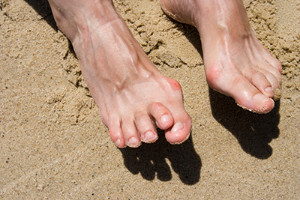
If one of your toe joints points upward instead of lying flat, it might indicate a condition known as hammertoe, where weakened toe muscles exert pressure on tendons and joints. This deformity can hinder walking and limit certain activities. Early intervention and preventive measures can help to avoid complications. Hammertoes affect the proximal interphalangeal joint, or PIPJ, causing the middle joint to flex upward. Ill-fitting shoes, especially those with narrow fronts or high heels, commonly trigger this condition. Rheumatoid arthritis or bunions can also contribute. Treatment includes wearing properly sized shoes and using splints or orthotic inserts. Surgery may be necessary for severe cases. Home exercises like toe stretches can help alleviate symptoms. Prioritize footwear comfort to prevent hammertoes and bunions from forming due to prolonged pressure on the toes. If you have a hammertoe that is causing you discomfort, it is suggested that you make an appointment with a podiatrist for an examination and relief methods.
Hammertoe
Hammertoes can be a painful condition to live with. For more information, contact Dr. Mark Gagnon from Advanced Podiatry. Our doctor will answer any of your foot- and ankle-related questions.
Hammertoe is a foot deformity that affects the joints of the second, third, fourth, or fifth toes of your feet. It is a painful foot condition in which these toes curl and arch up, which can often lead to pain when wearing footwear.
Symptoms
- Pain in the affected toes
- Development of corns or calluses due to friction
- Inflammation
- Redness
- Contracture of the toes
Causes
Genetics – People who are genetically predisposed to hammertoe are often more susceptible
Arthritis – Because arthritis affects the joints in your toes, further deformities stemming from arthritis can occur
Trauma – Direct trauma to the toes could potentially lead to hammertoe
Ill-fitting shoes – Undue pressure on the front of the toes from ill-fitting shoes can potentially lead to the development of hammertoe
Treatment
Orthotics – Custom made inserts can be used to help relieve pressure placed on the toes and therefore relieve some of the pain associated with it
Medications – Oral medications such as anti-inflammatories or NSAIDs could be used to treat the pain and inflammation hammertoes causes. Injections of corticosteroids are also sometimes used
Surgery – In more severe cases where the hammertoes have become more rigid, foot surgery is a potential option
If you have any questions please contact one of our offices located in Crestwood, Orland Park, and Summit, IL . We offer the newest diagnostic and treatment technologies for all your foot and ankle needs.
